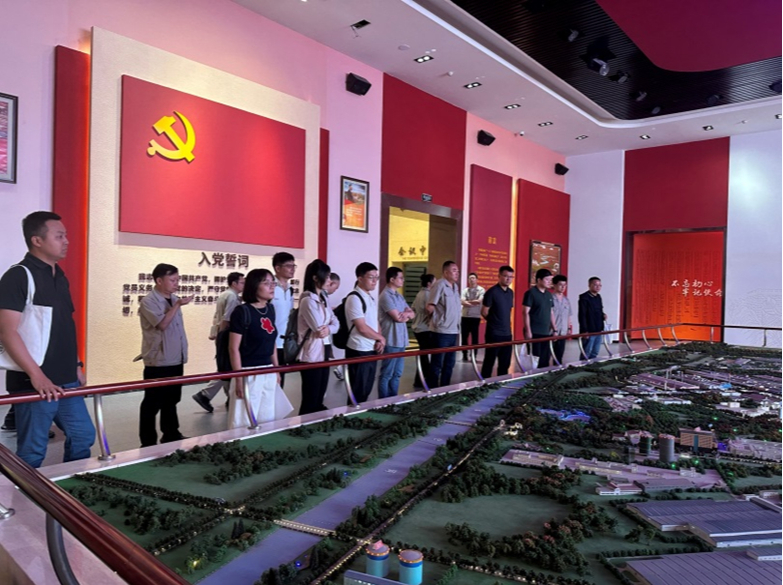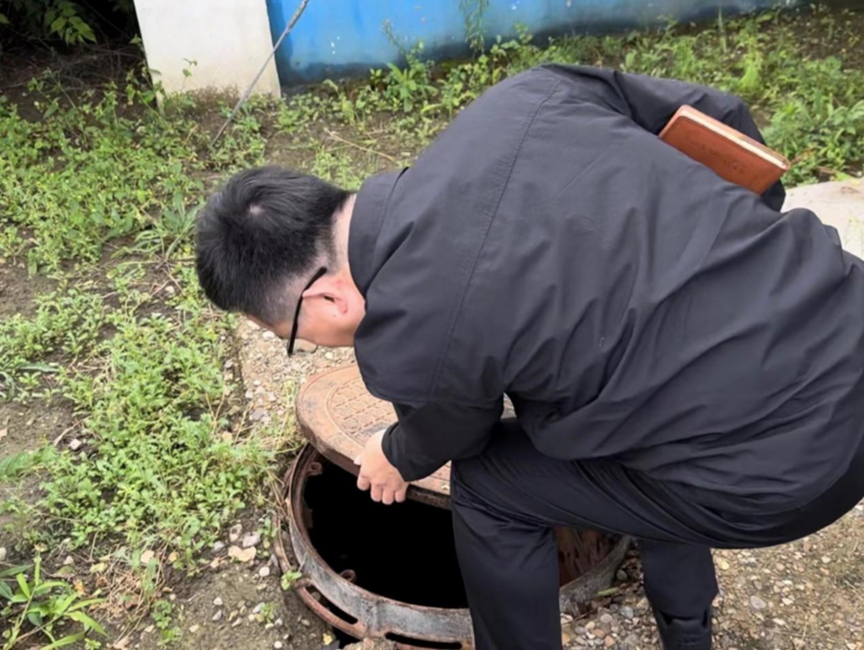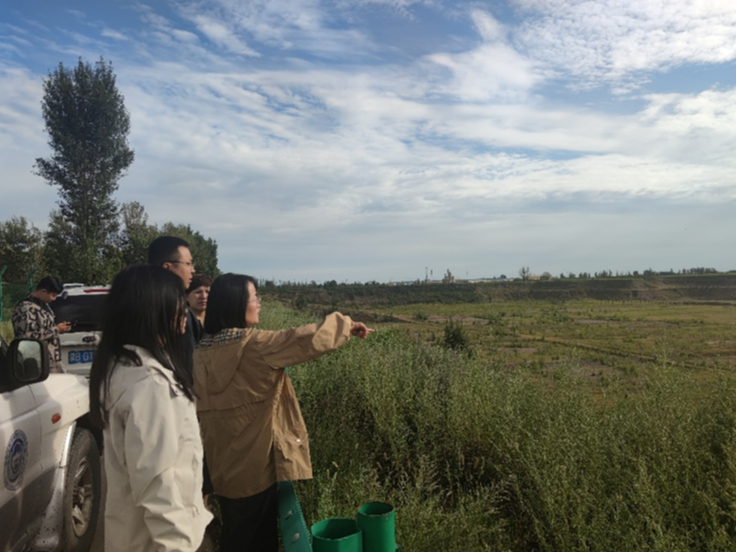Young cadres go deep into the grassroots to find out the real situation and solve problems, injecting new momentum into high-quality development
From August 29 to September 14, the Administrative System and Personnel Department of the Ministry of Ecology and Environment held the 19th special training class for young cadres on "Going to the Grassroots, Being down-to-earth, and Changing Work Style", aiming to build high-quality young cadres for ecological and environmental protection. Talent team.
This training continues "learningXiThe "research-exchange and interaction" model has invited experts from the Central Youth League School, the Environmental and Economic Policy Research Center of the Ministry of Ecology and Environment, the Central Commission for Discipline Inspection and the National Supervisory Commission and other units to teach young cadres. In addition, young cadres were divided into six groups and went to the grassroots ecological environment departments of Matsubara City, Jilin Province, Baotou City, Inner Mongolia Autonomous Region, and rural areas to carry out work surveys on "eating, living, working and working together" and social conditions and public sentiment surveys.
Support high-quality development with high-level protection
In September 8,XiJinpingDuring his inspection of Chagan Lake in Jilin Province, the General Secretary emphasized that a good ecological environment is a valuable resource for the economic and social development of Northeast China and an advantage in revitalizing Northeast China.
In autumn, Chagan Lake is sparkling, reeds are swaying, and fish are churning. The white and huge leaves of the wind turbine are slowly rotating under the blue sky. Tourists nearby are taking photos and checking in in the sea of flowers in the scenic area...
On September 3, the first, second and third groups of students in the training class followedXiJinpingThe General Secretary went to Chagan Lake Dayuer Wetland, Xinmiaopao, Pine Diversion Project Monument, Hope Square, Lake Entrance Section, Wild Duck Bay and other places for on-site research, and intuitively felt the natural features of Chagan Lake and the water quality of the lake. Through professional explanations, the students learned in detail about the remarkable results brought about by the river-lake connection project in western Jilin Province, the layout of ecological communities and the water diversion of the project.

In the afternoon of that day, the students had a discussion with relevant leaders such as the director of the Project Management Office of Chagan Lake Tourism Economic Development Zone in Qianguo County, the deputy general manager of Chagan Lake Fisheries Co., Ltd., and fully understood the history of Chagan Lake diverting water to raise fish and using fish to control water. Evolution and ecological restoration process, the students gained a further understanding of the value conversion of Chagan Lake ecological products.
During the investigation and discussion process, the students saw that over the past six years, the local government has kept in mind the instructions and worked hard to move forward, and implemented multiple ecological restoration and management projects. Through measures such as upper source control, lower pollution interception, external water diversion, and internal restoration, we have continued to restore the ecology and improve water quality, constantly polish the "golden signboard" of Chagan Lake, and strive to write a new chapter of high-quality development.
re-takeXiJinpingIn the journey that the General Secretary has traveled, the students have not only felt the beauty of Chagan Lake, but also a deep understanding of ecological protection and green development. Students believe that on the shores of Chagan Lake, General Secretary Xi Jinping's concern for the construction of ecological civilization spans time and space, inspiring our new generation of ecological and environmental protection iron army to be closer to the grassroots and nature.
Matsubara City polishes the story of Chagan Lake's golden signboard, and we can see that ecological construction and green development are the key to development and revitalization. Baotou City, Inner Mongolia Autonomous Region, which is on the important ecological security barrier in northern my country, also plays a vivid story of high-quality development because of its insistence on ecological priority and green development.
Baotou City is located in the wind and sand fixation belt in the northern plateau of the Inner Mongolia Autonomous Region and the comprehensive ecological management area of the Yellow River "Ji" Bay. It is also a traditional heavy industrial city in my country. It is both a major energy consumer and a major carbon emitter. Taking into account protection and development, ecology and economy, in recent years, Baotou has strived to transform towards the goal of energy conservation, emission reduction and low-carbon with the fastest speed and most powerful measures, and has continued to promote the green and low-carbon transformation of its development model and achieved remarkable results.
On September 2, the fourth, fifth and sixth groups of students in the training class went to Baotou Iron and Steel Group to visit the management and control integration platform and learnXiThe company's experience in ultra-low emission transformation, and conducted in-depth exchanges with the company's environmental protection staff on issues such as green mine construction strategies and the implementation path of the "double carbon" goal; went to Inner Mongolia First Machinery Group Co., Ltd. to learn about the group's high-profile activities such as painting, forging, and forging. Measures to reduce pollution and reduce carbon in energy-consuming and high-pollution links; Go to Shuangliang New Energy Technology Co., Ltd. to learn about the research and development, production and sales of photovoltaic modules, as well as the application in the national large-scale centralized photovoltaic power stations and distributed power stations built in the Shago Desert area.

Students said that enterprises in Baotou have thoroughly implemented the concept of green development, continuously increased investment in ecological and environmental protection, and embarked on a path of green and high-quality development through various methods such as equipment upgrading, industrial structure adjustment, and establishing and improving supervision and monitoring network systems. Actively fulfilling corporate social responsibilities, creating a good situation in which protection and development are equally balanced, and ecology and economy are win-win.
Listen to and investigate grassroots ecological and environmental protection problems on the spot, and put forward countermeasures and suggestions
Investigation and research at the grassroots level should focus on observing the actual situation and implementing policies accurately. Each group in this training class closely follows the actual situation of ecological and environmental protection, discusses and studies outstanding problems with local cadres and the masses, and strives to propose solutions and suggestions.
On the morning of September 2, the first, second and third groups of the training class arrived early at the Ecological Environment Branch of Qianguorros County, Matsubara City. The heads of various departments of the branch came to the conference room with stacks of materials. Both sides looked forward to finding new ideas through exchanges and conversations.
"I would like to ask the person in charge of the ecology department, what difficulties have been encountered in rural sewage treatment in the county in recent years?"
"I would like to ask our director about the organizational structure, work responsibilities and tasks of the branch."
"May I ask the person in charge of the Management Section, what is the quality of Qianguo's atmosphere and water environment? How to continue to combat pollution this year?"
......
Based on the actual situation of grassroots ecological and environmental protection work, the trainees of the training class couldn't wait to learn about the situation from the relevant responsible comrades of the branch.
Each targeted question stems from the fact that before conducting investigations and research at the grassroots level, each group has basically clarified the research theme, and collects data and conducts detailed research based on the theme to ensure that the research carries the questions and answers. We must clarify the problem, identify the crux, and have a targeted target, so that we will not "draw water from a bamboo basket for nothing."
In Qianguorros County, Matsubara City, in order to understand in detail the layout of Chagan Lake national and provincial water quality monitoring sections, the first group of the training class held discussions with relevant persons in charge of the county ecological environment monitoring station many times; combined with the research theme of beautiful rural construction, the second group of the training class acted separately, and the two teams discussed and communicated with the Ecology Section and Law Enforcement Brigade of the County Branch; In order to understand in detail the rural sewage treatment situation in various towns and villages in Qianguorluo County, the third group of the training class went to Sikeji Village and Baijiadian Village in Changshan Town, Xibotun Village in Jilatu Township and other places to chat with villagers. Listen to the most authentic voices in domestic sewage treatment, water toilet renovation, and domestic waste transfer and disposal...

In Baotou City, the research team of the fourth group of the training class focused on rural non-point source pollution, and conducted in-depth exchanges with the relevant leaders of the Cultivated Land Protection Section of the local Agriculture and Animal Husbandry Bureau and the Soil Section of the Ecological Environment Bureau on outstanding rural non-point source pollution issues such as pesticides and fertilizers, livestock and poultry manure, plastic film pollution, and straw burning, and went to some villages to inspect the renovation of toilets and the use of agricultural films; The fifth group of the training class focused on the widespread problem of illegal withdrawal of Yellow River water in Baotou and held symposiums with the local urban management bureau, water affairs bureau, water affairs group and other departments; the sixth group of the training class followed and studied at the Tuyou Banner Ecological Environment Bureau.XiUnderstand how the law enforcement detachment carries out law enforcement work on mine restoration, and discuss the underlying reasons for illegal occupation of forests and grasslands by mining, damaging the ecology, and the lagging ecological restoration and management of mines...

In the past few days at the grassroots level, each group in the training class has always adhered to the problem-oriented approach, solved problems throughout the entire research process, went deep into the grassroots, enterprises, and the masses, went straight to the problems and themes, went to the grassroots to find solutions, and gathered people's wisdom to seek answers.
The trainees of the training class agreed that young cadres leave the "three acres of land" of the office, see things, listen to the truth, understand the implementation of relevant policies, reflect on their shortcomings in their work, temper their political character, and strengthen their responsibility. Through this survey in the grassroots ecological and environmental department, we can listen to the experiences, experiences and experiences of grassroots staff, and truly feel the difficulty of ecological and environmental protection work at the grassroots level. The spiritual character of grassroots ecological environmental protection people further encourages young ecological and environmental protection "recruits" Strengthen their ideals and beliefs, and doXiJinpingA firm believer, loyal practitioner, and unremitting strivers of ecological civilization thought.







